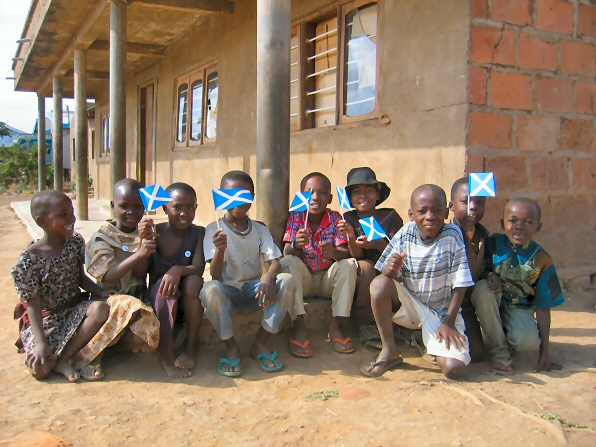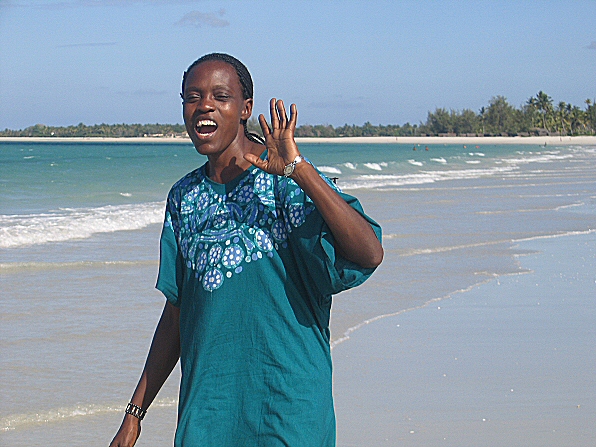Jambo from Tanzania to
Scotland from Davie:
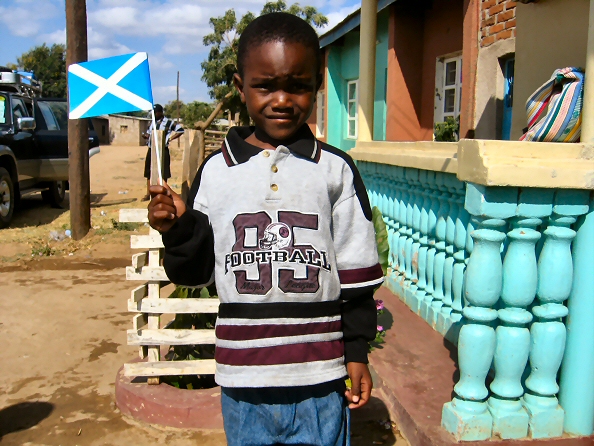
Well, what a wonderful
week I’ve had! Got back around 10.30 last night (Sunday) and still on a
high. For new readers’ benefit – I’ve been in Tanzania for a week,
shadowing the Hon. Estherina Kilasi MP in her rural constituency. The
main Party, the CCM (Revolutionary Party who have been in power since
independence), for the last election, introduced affirmative action on
their national list for women. Estherina, however, was elected
first-past-the-post in the Mbarali Constituency (unusual, and I think
only one of two female constituency MPs). The British Council are
funding a project amongst women in UK legislatures and their Tanzanian
counterparts. Estherina was here in Scotland earlier this year.
So, set off on Saturday
and arrived in Dar es Salaam around 9.30 am Sunday to be whisked away
from the airport for a 1200 km Land Rover drive south-west to Mbeya
District. Twelve hours, one puncture and one lunch-stop later we
arrived at Utungele to stay the night. I thoroughly enjoyed the drive –
what a great way to see the countryside, some flat plains, some wild
bush and some great mountains and valleys. First impressions – red
earth, trees/flowers, townships, mud-huts with corrugated tin roofs,
ribbon development along the country’s one main road – shacks, stalls,
shops – people everywhere walking, on ancient bicycles, in clapped-out
cars and vans. Vibrant colours – red, orange and yellow. This road also
goes through one of the national parks, so, real elephants and
antelopes!
On the way I learned a
lot about Mbarali Constituency – 16,000 sq. km., population 235,000.
Quite a constituency to service, especially since there’s only one real
road through it; most visiting requires off-road driving. Estherina’s
husband tells me that when they ‘do’ the constituency, they set off and
travel round it for two months. Certainly puts travelling round Central
Scotland in context.
Utungele Lodge was in a
coffee plantation – great setting, nice surroundings, but no working
generator, no running water. That was all fine, I’ve coped with this in
other places, but you know, problem with no electricity is that the
beasties don’t bother to hide when you walk in just with one candle
flame! Wee lizards I rather like, but I’ll never get fond of cockroaches
– I was so whacked though that I just kept my boots on! By morning, the
sun had chased them.
Monday morning 8 am – two
hour drive to Rujewa to meet the District Commissioner and District
officials. District of Mbaya was created around 10 years ago, and seems
to be well organised with lots of community development work going on –
credit unions, agricultural co-operatives etc. We had picked up a
translator, Enock, for me on the way – Tony Fisher and Flora Mahika from
the British Council travelled with us, but Tony reckons his Swahili
isn’t good enough whilst Flora reckons her English isn’t. Also
travelling with us I discover are a retinue of journalists – TV, Radio
and Press, so we are a convoy which causes great excitement when we
drive through settlements.
Next stop Ubaruku – what
a welcome, dancing, singing, hundreds of folk. The Women’s Rice Trading
Co-operative seems to run the show here – strong, strong women. The
format seems to be everywhere that the District Commissioner introduces
everyone, gives the crowd a lecture about the importance of education
for the children and how learning reading and writing isn’t enough
(Tanzania has achieved 92% literacy for 15 to 24 year olds, with 89% net
for primary school enrolment). There’s a big Government secondary
education push, but senior schools are not generally Government funded
and with 36% of the population below the national poverty line it’s
hardly surprising that there’s a big drop-out rate, especially for
girls. Estherina then gives a speech, and I follow her after a very
formal report on the project is presented to me. Scotland as a country
is not something that rural Tanzanians recognise – I am the lady MP from
England. Doing my best though with postcards and Saltires!
Getting and sustaining
secondary education for your children is hard here, but the commitment
is immense. Next stop Mawindi Secondary School. They have 70+ pupils,
one teacher (Headmaster himself). No electricity, shortage of water.
Building started back in 2001 by parents, have had some small grants
from various charities. It’s far off the beaten track and attended by
teenagers who come from far and wide. Apart from some Masai people (more
about them later) who I’m told just materialise from the bush, the
youngsters generally live on site – two dorms, boys and girls,
consisting of wall-to-wall mattresses. The Headmaster tells me that his
main problem is trying to get teachers to locate to such a poorly
serviced area. I wonder if there may be any small ‘visiting teacher’
initiatives back home that could help in any way. I don’t vocalise these
things to where we visit though because it’s unfair to raise false
expectations – if anything can be done, well that’s the time to talk
about it. As everywhere we go, a wonderful concert is staged. I know
that these events are ‘stage managed’ by the organisers, but the
enthusiasm of the villagers and schoolchildren is genuine. I suppose
when you live so far away from anyone else, then a visit is a huge
event, and everyone enjoys the time out and festival atmosphere.
Drive to Rujewa where
we’re staying at the Usungilo Lodge for two nights. Rujewa is a town of
16,000 people, the Lodge is in one of the main streets – small, no
running water, but there is electricity and hot food! My room’s fine and
comfortable, and no visible sleeping companions. The noises are amazing
though – all sorts of living sounds, constant, both internally and
externally, but rather comforting.
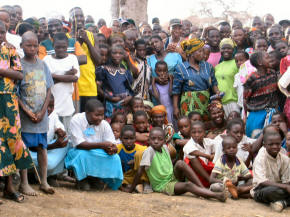
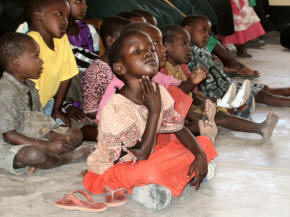
First stop Tuesday
Madibira Secondary School – what a welcome! When you visit a school the
whole community turns out. This school has been going for 4 years now –
I was surprised that it was so short a time because it seemed very
settled and organised. Better staffed, but better located, than Mawindi
School the previous day. Main problems again student drop-out. The
District Commissioner has a rant about this to the crowd and shows off
the young successful Tanzanians who are in our convoy – Flora from the
British Council, Enock the translator, Renato from the TV company;
they’re good examples, but I suspect started from more privileged
backgrounds than most of the youngsters here. Having said that Estherina
Kilasi herself comes from this constituency and showed me the village
and the house where she was raised – it certainly couldn’t have been an
easy upbringing. It was at this school that I first tried ululating
(that wonderful sound that the African women make when celebrating) –
difficult, much to the hilarity of all present! I’m persevering though –
determined. I think my dancing caused as much hilarity – what really
strikes me about the singing and dancing here, compared to home, is that
the boys and men sing and dance with the same gusto as the women and
girls. It’s so uninhibited and just sheer celebration of the joy of
life.
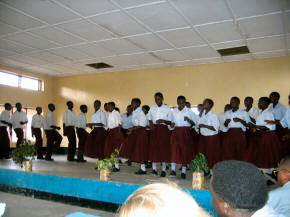
Moved on to Madibira
Smallholders Farming Co-operative and Community Bank/Credit Union. First
of all visited the paddy fields and irrigation works. 3000 shareholders
in the Co-op, with one hectare each. It is interesting that in a family,
wife is an individual shareholder in her own right, and any child when
they reach the age of 18 years. It was a government sponsored scheme and
elements of ownership have already been passed to the Co-op with more to
come. The irrigation works by damming a nearby creek and using varying
ground levels to flood the field – no machinery to break down, the only
maintenance being to make sure that the channels are kept clean and free
from brush.
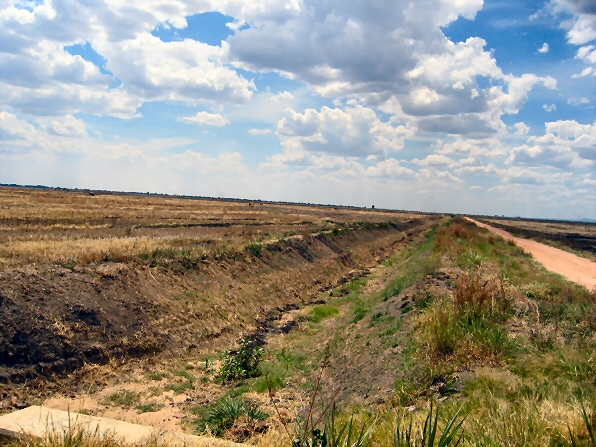
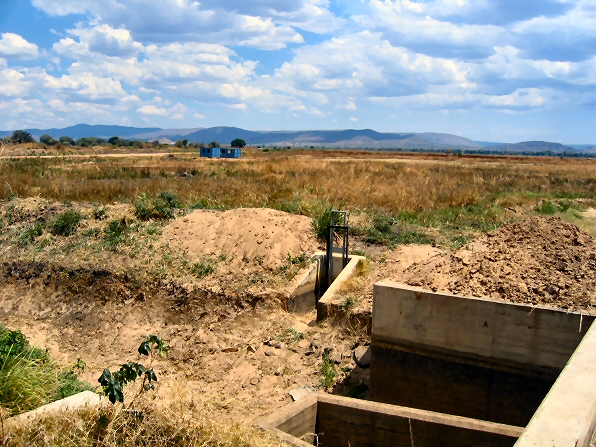
Moved onto the community
hall to meet the Community Bank representatives. Again I receive
extremely formal reports on the two projects. Read out in full and then
presented in a sealed envelope. This is the tradition and extremely
useful to have the written copies when you’re packing in so many visits
in such a short time – helps to sort it all out in your head later. I
was able to speak to the community about the co-operative movement and
the credit union movement here in Scotland – okay, we don’t face the
same adversity, but let’s face it, historically we did. There is common
ground. I also spoke about fair trade – the rice grown here is organic
and I had been told that their main issue to surmount is marketing, so I
mentioned the Fair Trade Foundation. No-one had heard of it, even
Estherina and the District Commissioner (never did learn his name!). I
had presumed they would know these things; you should never presume. If
nothing else, it’s good to drop seeds of knowledge that can grown and
maybe help in the future.
A good lunch again – lots
of rice, pulses, banana stew and fruit. I realise that I’m starting to
accumulate gifts. So far, earthenware pots/khangas (cotton wraps), a
massive sweet potato, and now lots and lots of rice!
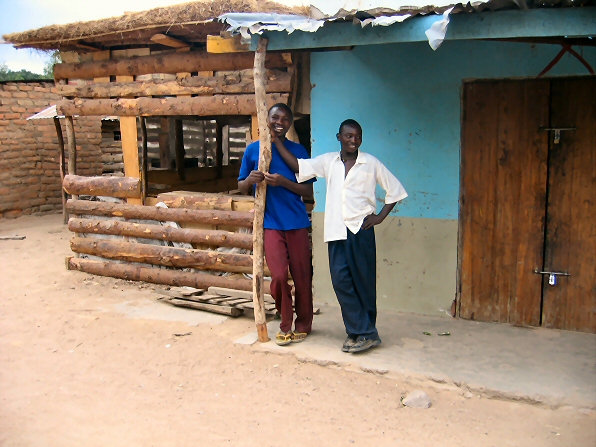
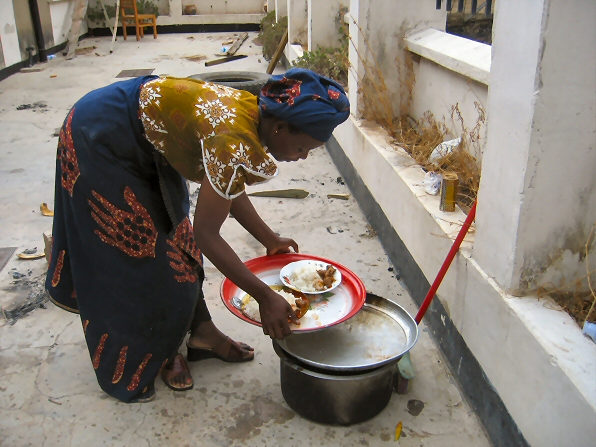
Still in Madibira Ward in
the afternoon at another public meeting. This is the first time that I
am really aware of just how my presence is being used politically for
the CCM. The registration for voters for next year’s election is ongoing
at the moment. The District Commissioner is quite blatant at this public
event, for example – along the lines of “Do you know that if you had not
voted for the Honourable Mrs. Kilasi, then the Honourable Mama Linda
would not be here, because no-one in the UK would be interested in
Madibira!” I suspect Enock was not supposed to translate this bit – I
had noticed a couple of times that the DC had distracted him at crucial
moments. I quite like being ‘Honourable Mama’ though! ‘Mama’ seems to be
the casual way of addressing women – I’m told that ‘Bibi’ which means
‘sister’ is more formal.
More singing/more
dancing/more tutoring in ululating – CCM Teeshirts seem to be the normal
apparel here – more gifts (cooking stool to sit on while I’m stirring my
pots).
Everywhere we go we are
late – by hours! It seems to be the norm though, so we don’t reach the
formal reception back in Rujewa until 9.30 pm, although it was supposed
to start at 7.00 pm. Important officials there, including the Regional
Commissioner, district councillors, community leaders. Very formal
meeting, long introductions, long speeches from all of us. However, once
the formalities were over, the fun began again – great food, great
dancing, great fun dressing me up in traditional clothes! Driving back
to the Inn I couldn’t understand why I was so hot until Flora pointed
out I had the equivalent of six dresses on! Bed at 1.30 am to be on the
road again at 8.00 am.
Well Wednesday was a real
treat. Two hour drive, off-road, to Matabete village to visit the Masai
women’s group – community co-operative making their beautiful jewellery
to sell. The men tend the cows. The Masai, also known as the Cattle
people are nomadic in Tanzania and Kenya, and are one of the few (some
folk said only) main tribes in Africa who have maintained both a genetic
and cultural identity. I noticed everywhere we drove through, and later
in the week in Dar es Salaam, that you could immediately pick out Masai
people because many still wear their traditional clothing.
Again, the entire village
was out to meet us and the concert was to me like watching a movie. I
remember as a child seeing film of these people - tall, thin, majestic,
proud – being fascinated at their clothes and jewellery and the way they
danced; the warriors jump (vertical take-off!) and the women shimmy like
nothing I’ve ever seen before (a saying of my dad’s came to mind – “It
must be jelly, ‘cos jam don’t shake like that!”). I felt so privileged
to be there, on the spot, and watching this spectacle – not only that,
but being welcomed, and sitting down to eat with them. The Masai seem to
exist on a full protein diet – meat, meat and more meat, not a veggie,
carbohydrate or fruit in sight. The original Atkins Diet.
The Jewellery
Co-operative was fascinating – all the women in the village and beyond
participate, and the profits are used to educate the children. Some
wonderful photographs and fabulous memories. Everyone in our entourage
bought loads of jewellery for gifts – beautifully made pieces of beads
and metal.
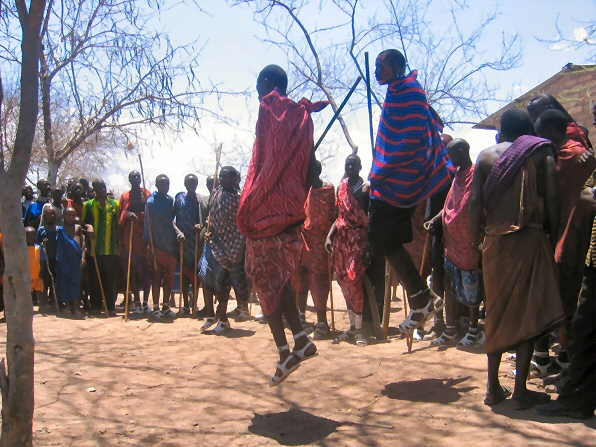
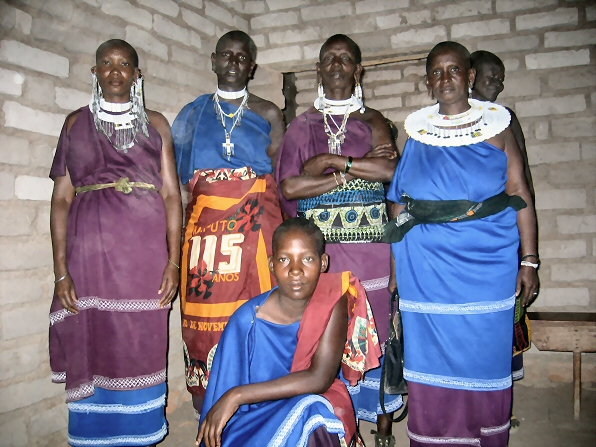
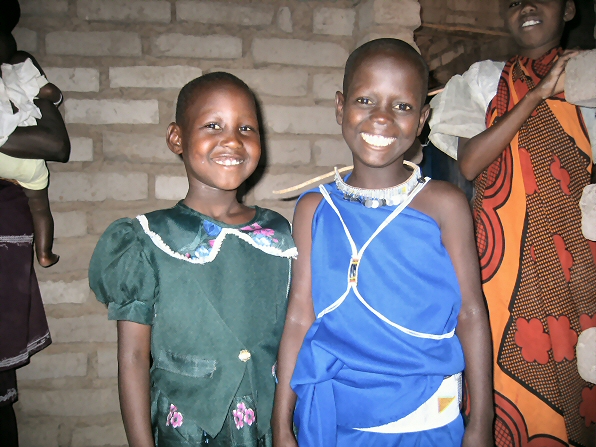
Two school visits in
quick succession in the afternoon – Amani Secondary school which has
been going for 2 years and Chimala Secondary School which is a well
established school (1984) generally for children of government
officials, office-workers etc. and therefore better funded than others
I’ve visited. Both fascinating – Amani for the sheer commitment and
dedication of teachers and parents, and Chimala for their achievements –
2260 pupils have graduated from here, some to further education. Also,
this school participates in the community by outreach health teaching
(voluntarily by teachers) and by providing tap-water services.
I hope very much that I
can in some way create links with schools I’ve visited and schools in
Central Scotland. Not financially particularly, but just to allow those
in Mbarali to know that people are aware of how hard they are trying and
that they have support. It can only do both sides good to learn from
each other.
The final visit of the
day was to the town of Igurusi to visit youth projects – literacy,
health awareness (generally HIV and AIDS). This was I think the poorest
place I visited during the three days, and I really don’t think I’ve
ever seen so many children in the one place. From the moment I left the
vehicle I was mobbed by them – prodded, nipped and stroked, all very
affectionately though! More speeches! More singing! More dancing! More
politicking! A big treat for Enock here – a couple of dancers came on
and he was delighted that they were from his tribe, the Nyakyusa, and he
could show off his culture to me. They were so funny (supposed to be)
and I was seriously in stitches watching the shapes they got into and
their facial expressions. I even got a shot of banging their big drum –
what a tension releaser that is, I should get myself one here in
Scotland!
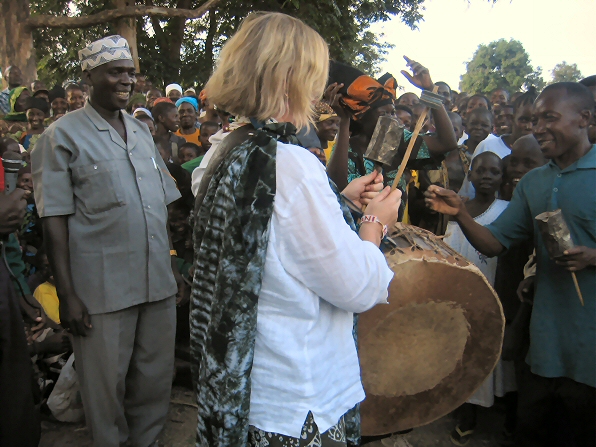
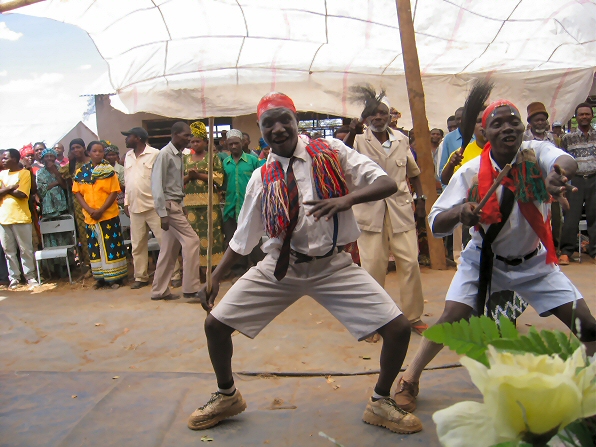
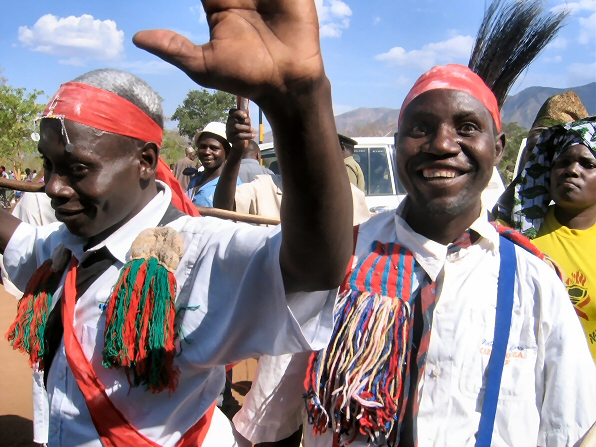
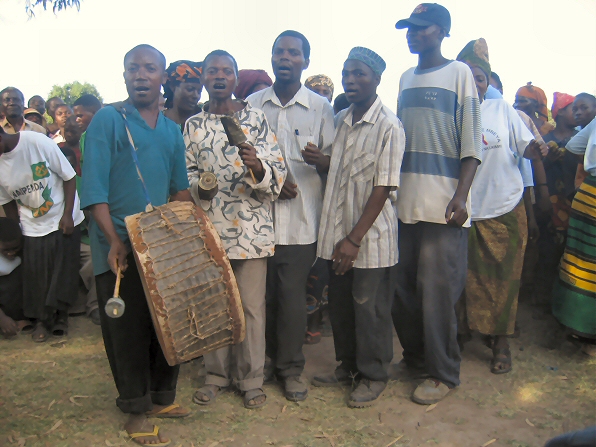
Well, that was the last
of the constituency visits. I’ve yet to really mug up on all the reports
I was given, and to seriously think about how I can do anything to
support any of these organisations, even in the smallest of ways. I’ll
have to seriously mull it all over and speak to some folk in Scotland.
Thursday left the Inn at
5.30 in the morning for the drive back to Dar es Salaam. It took 13
hours this time because we broke down halfway. Well looked after by the
local folk though while we waited for a replacement. Dar es Salaam’s
Holiday Inn was a pleasure on Thursday night I must say – lying in the
bath contemplating just how damned fortunate my life is. I remember the
first time I visited East Timor (the 1999 Independence Ballot), when I
came back I found it difficult to tap back into what was going on in
Scottish politics at the time because it all seemed so unimportant in
comparison. Also, there was a feeling of residual guilt that I was safe
and privileged. But, you have to get over these understandable feelings,
because they really are not constructive and it doesn’t help anyone else
if you go around with a hair-shirt on all the time. There’s a balance to
be struck between awareness and despair, and I must say that what I saw
in these four days was a people which despite facing hardship every
single day had a joy of living that was uplifting. We could learn so
much from them about what really is important when you remove the
fripperies and look at the basics.
Anyway, enough of my
internalising!
Friday was a day of
press-conferences, meetings with the High Commissioner (in Commonwealth
countries you don’t have a British Ambassador, you have a High
Commissioner – a bit Gilbert and Sullivanesque I think), Department for
International Development. The DFiD funding to Tanzania is currently
£80m and rising to £110m next year, 75% of this being paid as general
budget support to the Government (strictly monitored because there is
still a corruption problem – doesn’t seem to be directly into the
pockets of high officials or anything suchlike, but more of a ‘perk’
culture).
Also discovered this
morning that we’ve been on the TV News every night and in the press
every day. The TV company have promised to send me the videos of the
diary they took in the constituency, so that will be really useful for
presentations to schools etc.
Final visit on Friday was
to the Tanzania Women Lawyers Association – a membership organisation of
women lawyers who give free services to Tanzanian women, in the absence
of any legal aid provision. Cases dealt with are mainly matrimonial,
land and domestic violence. Currently, in the absence of definitive
laws, traditions are followed - for example, if a Tanzanian woman is
widowed the property or any belongings of her husband’s, if there are no
adult sons, first shout goes to the husband’s oldest brother or father.
This organisation lobbies for changes in law and fights individual cases
in the courts. They are also very active in campaigning on HIV/AIDS
issues. Extremely impressive. Again, links with any professional such
organisation in Scotland would be welcomed by the Management Committee.
Saturday – my last day –
was pure relaxation. Dar es Salaam is a lovely city, with quiet beaches
just a short ferry-ride away, and fascinating markets just a short
drive. Spent time saying goodbyes to Estherina and Mr. Kilasi, to Flora
and Tony from the British Council. I really couldn’t have had better
company for a week, and really appreciated the time they took, even on a
Saturday to make sure my experience was great right up until the end. It
was.
Kwa herri from Flora and
the kids in Rujewa.
